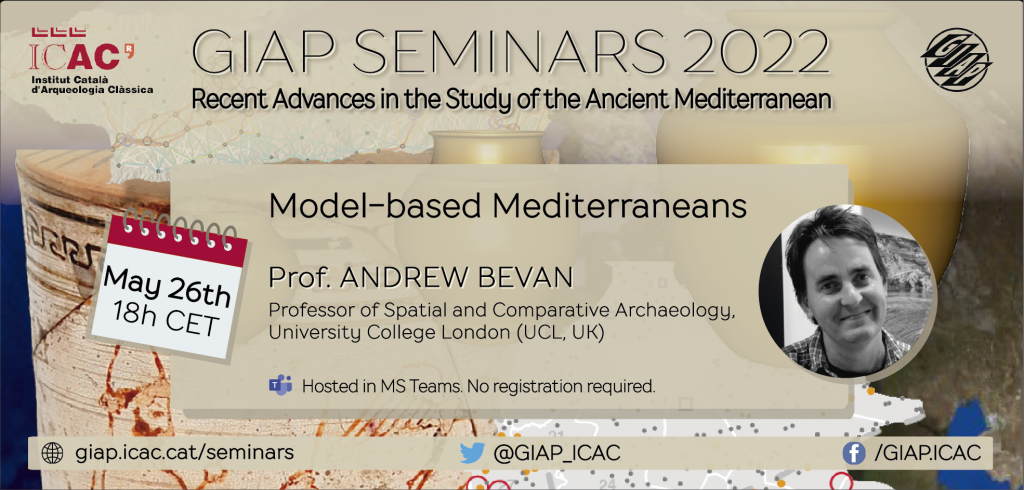After a very successful first series in 2021, the GIAP Seminars come back for a 2nd year!
Organised by GIAP predoctoral and postdoctorals researchers, #GIAPseminars are a reflection of their current research interests. The series aims to provide glimpses of original and current research across the world, opening up new horizons in Landscape, Computational and Palaeoenvironmental Archaeology, and Bioarchaeology.
Regardless of career stage or academic position, GIAP invites prominent researchers that reflect the interdisciplinarity and diversity of the field. Overall, the GIAP Seminars are an excellent opportunity to foster talent, broaden interests, and network.
There will be 1-hour monthly seminars, with 45′ of talk & 15′ of discussion, from February to June 2022. Addressed to researchers and students with interest in the listed topics. More info.
GIAP webinars are online, open events. No registration is required. We’ll share access links through our websites and social media.
Session 3 will be next May 26, 18 h CET, with Prof. Andrew Bevan (professor of Spatial and Comparative Archaeology, University College London (UCL, UK).
‘Model-based Mediterraneans’
Access the webinar here: https://bit.ly/JoinGIAPseminar
No registration is required. Hosted in Microsoft Teams (no Microsoft/Teams account needed)
Abstract:
Even when archaeology is almost everywhere awash in new evidence, the Mediterranean still boasts one of the most densely explored and intriguing records in the world. Whether we are referring to its anthropogenic landscapes, its political structures, its various affordances for food security, or its many artifact traditions, Mediterranean life exhibits fascinating swings between connection and fragmentation, abundance and scarcity, opportunity and isolation, perhaps even between utopia and dystopia. In academic terms, these extremes have been matched by a healthy to-and-fro between minute attention to the detail of Mediterranean evidence on the one hand, and more sweeping synthetic statements on the other, both over time and space. Against this background, making and breaking ‘models’ of the Mediterranean — computational or theoretical, simple or complex — are a key means by which we navigate the complexities of regional human history. This paper both offers an overview of model-based approaches to the Middle Sea and proposes some particularly exciting agendas.
Keywords:
Computational models, spatial analysis, material culture, Mediterranean archaeology, human settlement, landscape ecology
About Prof. Bevan:
Andrew Bevan is a teacher and researcher at the UCL Institute of Archaeology, UK. His personal research interests cluster at the intersection of traditional subjects such as archaeology, history, geography, and anthropology, while these interests have often been addressed via the flexibility and formality that computing affords, and with a particular focus on early societies across the Mediterranean and Eurasia.






